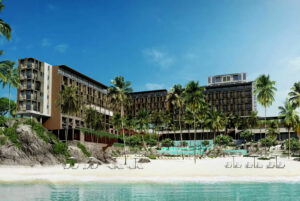HOSPITALITY chains are working to enhance sustainability features and workcation offerings to address the increasing demand from foreign tourists, according to industry executives.
Cyndy Tan Jarabata, president and chief executive officer of TAJARA Leisure & Hospitality Group, Inc., cited the growing appeal of sustainability-focused and nature-themed hospitality properties.
“A lot of foreign tourists are slowly coming back, the expats have also returned for work… so we’ve seen growth not just in Metro Manila, but also in island destinations,” she said on the sidelines of an event last month.
Hospitality properties must “create something uniquely different that would address the needs of this new generation of travelers,” Ms. Jarabata said, citing sustainability and back-to-nature designs.
The Philippines welcomed 5.95 million international visitors last year, data from the Department of Tourism showed. South Korea recorded the highest number of visitors at 1.57 million, followed by the United States (1.08 million), Japan (444,528), China (313,856), Australia (299,286), and Canada (269,300).
“We are aggressively tapping into international markets such as Taiwan, Japan, India, and the Middle East, tailoring our offerings to meet cultural preferences and travel needs, thereby attracting a more diverse global audience,” Nonito O. Cuizon, director for marketing at Robinsons Hotels and Resorts (RHR), told BusinessWorld in an e-mail.
RHR’s pipeline includes expansions in key destinations such as Siargao, Bohol, and Pangasinan.
Mr. Cuizon said that Fili Hotel in Cebu and Dusit Thani Mactan Cebu are looking to capture demand for Indian destination weddings.
RHR is also expanding its loyalty program to include special perks, discounts, and exclusive offers. It is improving its direct booking channels and upgrading its facilities.
For its part, property management company Discovery Hospitality Corp. (DHC) said it is refining its product offerings to meet increasing demand for workcations.
“We are improving our products to appeal to those who fly hybrid,” Lynette Ermac, senior vice-president and head of sales and operations at DHC, said in an e-mailed reply to questions.
DHC also seeks to ensure that its properties include areas for remote work and facilities for meetings, incentives, conferences, and exhibitions (MICE) and small-scale social gatherings.
“Inspired by changing generational behavior, more digital interaction, and more environmental conscience, guests now search for more meaningful, customized, and real experiences. Additionally in demand are wellness-oriented stays and sustainable travel,” Ms. Ermac also said.
“From carefully chosen local activities to tech-integrated service touchpoints that prioritize the human element, these trends are shaping the design of our products,” she added.
Hospitality chain The Ascott Limited is leveraging its MICE facilities and cultural immersion activities to capture demand for experiential and work-related travel.
“We embrace the concept of leaving destinations better than before by promoting local experiences, sustainable practices, and unique eco-friendly experiential stays,” Loven C. Ramos, director of brand and marketing, said in an e-mail.
Mr. Ramos said Ascott’s serviced residences, which combine hotel and home-like amenities, are ideal for long-term stays and workcations.
He also noted that properties such as Ascott Bonifacio Global City, Ascott Makati, Citadines Bay City Manila, and Citadines Roces Quezon City offer state-of-the-art meeting rooms, event spaces, and diverse culinary offerings.
“Soon, we will also be unveiling the ballroom and MICE facilities at Citadines Bacolod City, which will be the region’s largest when it opens,” he added. — Beatriz Marie D. Cruz

